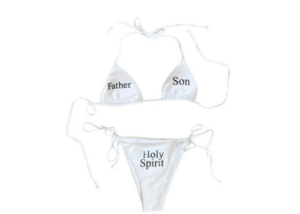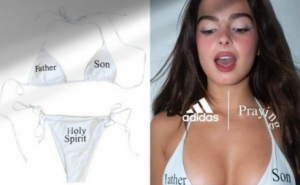Christian influencer Brittany Dawn Davis has gone after TikTok star Addison Rae for posing in a “Holy Trinity” bikini for the brand Praying by Adidas.
Rae has faced so much backlash over the photo since she posted it a week ago, she already took it off her Instagram. The bikini is still available on Praying’s website for $100 — the top features “Father” and “Son” on either side of the piece, while the bottoms read “Holy Spirit.” Rae has not publicly addressed the controversy beyond deleting the ad.

Rae is not the first celebrity to wear Praying merchandise. Olivia Rodrigo, Charli XCX, Euphoria’s Chloe Cherry and Christina Aguilera have been photographed wearing Praying attire — Aguilera is even featured on Praying’s Instagram wearing a French version of the same bikini Rae wore.
Davis is a Christian influencer who runs spiritual retreats inspired by her ministry Instagram account. Davis’s personal Instagram is dedicated to her faith.
With how popular Rae is — she has 88 million fans on TikTok and 40 million Instagram followers — and with how controversial the brand Praying is, it’s no surprise that the ad went viral on social media and was covered by multiple outlets. But a scroll through Davis’s Instagram shows that she doesn’t normally provide commentary on what celebrities are doing or wearing.
Staikouras for exit of Greece from Enhanced Supervision: “A great national goal has been achieved”
“My first response was: I felt sick to my stomach,” Davis said in a video response to Rae’s ad. “My spirit felt crushed”.
Davis doesn’t seem angry with Rae but her overarching argument in the video appeared to be that people and brands have become too comfortable “slandering” Christianity.
“Why is it always Christians? Why? It’s annoying at this point, it’s frustrating,” she said. “You don’t see this country or this world, in general, slandering other religions”.
In a UN report from March, a human rights expert did express concern over an increase in discrimination against people for their religious beliefs — but specified that those who were being targeted were religious minorities. Approximately a third of the global population identifies as Christian.
Findings from the Public Religion Research Institute and Brookings in 2016 noted an increase in how many Christian-identifiying Americans thought they were “victims of discrimination.” The Atlantic speculated at the time that this mindset could be from lower levels of interest in religion overall.
But Davis seems to share similar thoughts with a lot of others who denounced Rae’s ad.
“All we can do is pray for the truth to be revealed to this girl,” Davis concluded, talking about Rae. “We cannot jump on the cancel culture train as Christians.”
Source: In the Know
Ask me anything
Explore related questions





